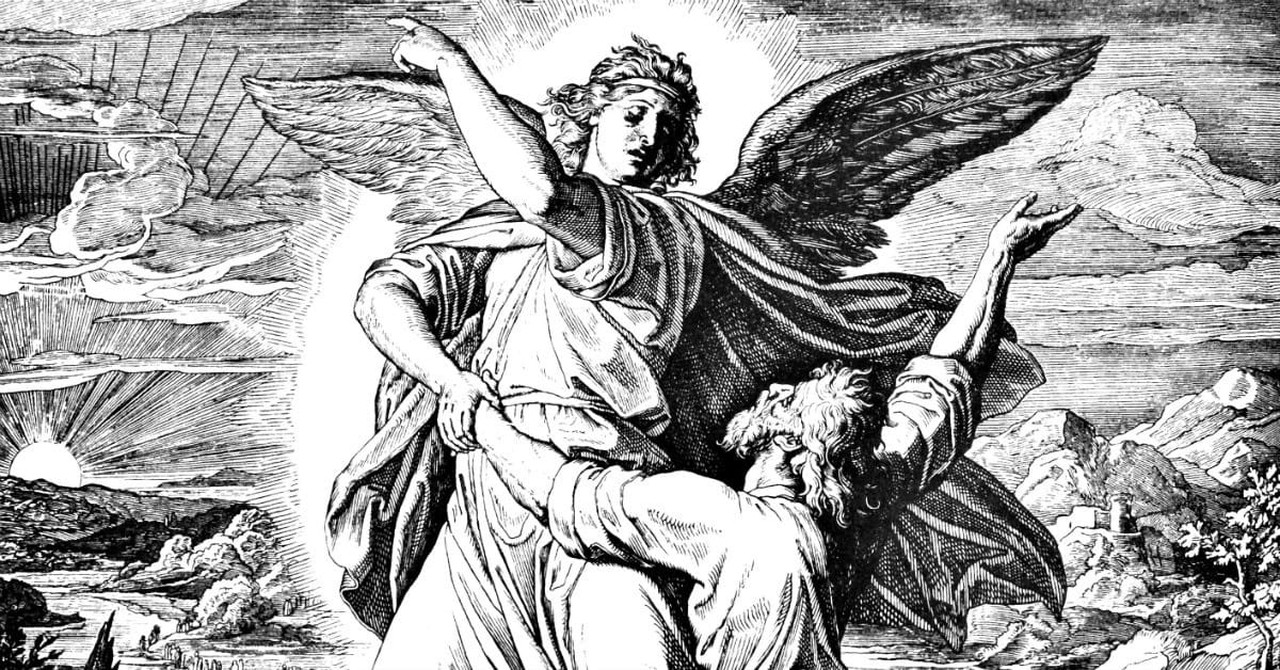10 Times Jesus Showed Up in the Old Testament and What They Reveal

The Bible reveals the story of a loving God who’s been pursuing His children since the beginning of time. This God loves us so much, He sent His Son to rescue mankind and reconcile us with Himself. Jesus, our Savior who took on flesh, bore our sin, and died in our place, is the hero of this redemptive story, and as such, can be found throughout Scripture, beginning with Genesis, when sin first invaded God’s “very good” creation.
Jesus didn’t just explode on the first century Palestinian scene. We can catch glimpses of Him and His heart sprinkled throughout the Old Testament.
Often noted as “the Angel of the Lord,” (rather than an angel) here are 10 encounters scholars believe Old Testament people, such as Abraham and Gideon, had with Jesus and what each occurrence reveals about our Savior and His love for us.
Photo courtesy: ©Thinkstock/NiseriN
1. The "Angel" who appeared to an Egyptian slave named Hagar.

1. The "Angel" who appeared to an Egyptian slave named Hagar.
SLIDE 1 OF 10
Originally from Egypt, Hagar lived first as a slave, then, when her mistress remained infertile and needed a surrogate, as Abraham’s second wife and finally as the mother of his firstborn son. (Genesis 16)
She succeeded where her mistress failed and soon grew contemptuous. Before long, things escalated and Hagar fled into the wilderness.
Hagar was pregnant, hopeless, and alone. Jesus met her there, told her to return home, and promised her a hope-filled future. From then on, she referred to Him as El Roi, the God who sees, saying, “You are the God who sees me… Have I truly seen the One who sees me?” (Genesis 16:14). In other words, “Here, now, in my destitute state, have I truly encountered God?”
The answer was yes. Jesus came to her in the middle of her despair and offered her hope.
He does the same with us today. The God who saw that helpless Egyptian and all her pain sees us and our pain as well. He meets us there, and by His grace, promises better days will come, if not on earth, then in heaven.
Photo Credit: ©GettyImages
2. As one of three strangers who visited Abraham.

2. As one of three strangers who visited Abraham.
SLIDE 2 OF 10
In Genesis 18:1, we’re told, “The Lord,” Yahweh in Hebrew, appeared to Abraham near “the oak grove belonging to Mamre” (NLT). Abraham, still childless, was 100 years old. His wife, still barren, was 99. Both were well past child bearing age. But one day, three strangers approached, Jesus among them, and promised, a year from that day, Abraham and Sarah would finally have a son.
Sarah found this news so impossible, she laughed. But a year later she became pregnant with the “child of promise.”
Jesus reminded Abraham and Sarah that they would indeed receive a child as promised—who, ultimately, pointed to Himself, our Savior, in whom every one of God’s promises come true.
Photo Credit: ©GettyImages
3. The Angel who stayed Abraham's hand as he was about to sacrifice his son.

3. The Angel who stayed Abraham's hand as he was about to sacrifice his son.
SLIDE 3 OF 10
After decades of longing, God’s promise finally came true. Sarah and Abraham’s beloved child was born. Only to be taken from them in the most heinous, unthinkable way—as a sacrifice at the hands of his own father (Genesis 22:1-19).
Or so it seemed.
But believing God could raise his son from the dead, Abraham obeyed God’s command and set out with his servant and son to offer the most painful sacrifice imaginable.
En route, not seeing the animal they needed, his boy asked, “Where is the sheep for the burnt offering?”
Abraham answered, “God will provide, my son.”
He did. Moments before Abraham was to slay Isaac, “the Angel of the Lord” stopped him, saying, “Now I know that you truly fear God. You have not withheld from Me even your son, your only son.”
Then, looking up, Abraham saw a ram caught in a thicket—the sacrifice he offered in Isaac’s place.
Abraham named the location Yahweh-Yireh, which means “the Lord will provide” (Genesis 22:14).
Through the ram, God provided the sacrificial animal that set Isaac free. Similarly, through the Son, God provided a sacrifice that purchased our freedom.
Photo Credit: ©GettyImages/radub85
4. The Man Jacob wrestled with before encountering his estranged brother.

4. The Man Jacob wrestled with before encountering his estranged brother.
SLIDE 4 OF 10
Jacob, father to 12 sons from which the 12 tribes of Israel emerged, deceived his brother out of his birthright and blessing then fled in fear of his life. Twenty years later, returning with his wives and children, he learned his brother was coming toward him with 400 armed men. (Genesis 32:6).
Terrified, he cried out to God for help then spent the night wrestling with an unnamed Man. He refused to let go until this man, later noted to be God Himself (Genesis 32:30; Hosea 12:4), blessed him.
Up against Esau and his army, Jacob was desperate and outmuscled. God was his only hope, and God came through. The next day, when Jacob met his brother face to face, he received not retaliation but forgiveness and blessing.
Because of our sin, we also face certain death. Jesus is our only hope. Grace comes through surrender, but first we may have to wrestle with our pride and self-sufficiency. The moment we turn to Christ, however, we receive life eternal.
Photo Credit: ©GettyImages/Ruskpp
5. The Voice that spoke to Moses within the burning bush.

5. The Voice that spoke to Moses within the burning bush.
SLIDE 5 OF 10
Moses, an Egyptian prince turned Hebrew shepherd, had settled into a quiet, peaceful life as a husband and shepherd. But one day, he noticed a bush engulfed in flames that failed to consume it. According to Exodus 3:2, the Angel of the Lord, later self-revealed as the Great I Am and the God of Abraham, Isaac, and Jacob, appeared to him from within that bush.
As Moses stepped closer to investigate the strange sight, Jesus called out to him by name and revealed core truths about Himself. “I Am Who I Am,” He said. (Exodus 3:14). In other words, “I’m present and eternal. The self-existing One from Whom everything else arises.”
When God commissioned Moses to be His people’s liberator, he felt overwhelmed by the task laid before him, but in three simple words, Jesus assured him his success wasn’t dependent on his strength or oratory skills. The Great I Am was sending him, would go with him, and would stand beside him.
With that kind of power, Moses couldn’t fail.
If we belong to Jesus, we have that same assurance of God’s presence. He is and will ever be the Great I Am, all-sufficient, eternal, faithful, and omnipotent One.
Photo Credit: ©GettyImages/vlastas
6. In the cloud that led the Hebrews through the desert.

6. In the cloud that led the Hebrews through the desert.
SLIDE 6 OF 10
Through Moses, God freed His people from centuries of slavery and led them, with a pillar of fire at night and a cloud by day, toward the Promised Land. (Exodus 13:21) This redemption and inheritance carried a dual meaning. Yes, God rescued them from physical bondage. But His desires for them, and for us, are much farther reaching. In Israel’s Exodus, we catch a glimpse of God’s redemptive plan in Jesus, the One who died to free us from our slavery to sin.
This connection is made clear in 1 Corinthians 10. Verses one through four point back to that ancient story, where God rescued His people then guided them, with a cloud by day and a pillar fire by night, toward a land long promised. This passage reveals our unshakable foundation in Christ. “All of them,” he said, “ate the same spiritual food” and “drank from the spiritual rock that traveled with them, and that rock was Christ.”
Jesus provided for their every need, as they made their way through the desert, and in so doing, taught them to rely completely on Him. He wants the same for us. Our jobs or health may fail, but Jesus never will. Those who trust in Him find a sure rock upon which to stand.
Photo Credit: ©GettyImages/yotrak
7. To Gideon before commanding him to defeat the Midians.

7. To Gideon before commanding him to defeat the Midians.
SLIDE 7 OF 10
After rescuing His people from slavery, God gave them a promise and a warning. If they loved and obeyed Him, all would go well, but rebellion would lead to consequences. (Deuteronomy 11:8-32) Unfortunately, due to partial obedience that led to rebellion, the people forfeited their protection. Unguarded and defenseless, they eventually fell prey to the Midianites who brought them to the brink of starvation. (Judges 6)
Desperate, they cried out to God for help, and He responded by commissioning a frightened, seemingly insignificant man named Gideon to lead the nation into battle.
At first, Gideon had no idea He was talking to Christ. But when flames spontaneously erupted and devoured his offering, he realized he’d encountered God. Terrified He exclaimed, “I’m doomed!” He thought for sure he’d die, but God responded, as He does to us when we’re consumed with fear, “Do not be afraid.”
Jesus’ awesomeness initially terrified Gideon, but later brought Him peace—when God fought on his behalf. Jesus fights on our behalf as well, and He alone commands our victory.
Photo Credit: ©GettyImages
8. As the Angel who told Samson's mother she'd have a child.

8. As the Angel who told Samson's mother she'd have a child.
SLIDE 8 OF 10
After six cycles of rebellion, oppression, followed by divine liberation, a powerful nation once again besieged God’s people. But as usual, God had a plan. One day, the Angel of the Lord, later revealed as God (Judges 13:22) appeared to a barren Israelite woman. “You will soon become pregnant and give birth to a son,” He said. “He will begin to rescue Israel from the Philistines.”
Shaken, the husband and wife asked God for more instructions regarding how to raise this special child. In answer to their prayer, God appeared twice more, during the last of which he told Samson’s father to prepare an offering. When they complied, Jesus revealed His glory by ascending to heaven in the fire. Upon seeing this, the husband and wife fell with their faces to the ground. “We will certainly die,” the man said, “for we have seen God.”
But God didn’t come to condemn or kill them. Rather, He came to save them. Jesus didn’t come to condemn us either. He came to give us life. (John 3:17)
Photo Credit: ©GettyImages/kieferpix
9. The Majestic Being the prophet Isaiah saw sitting on a heavenly throne.

9. The Majestic Being the prophet Isaiah saw sitting on a heavenly throne.
SLIDE 9 OF 10
When God commissioned Isaiah to speak for Him, He did so through a vision. (Isaiah 6:1-10) In it, the ancient Hebrew saw Christ, sitting on a lofty throne and surrounded by worshipping angels. Scripture tells us the temple shook and was filled with smoke.
Standing before a holy God, referred to here as the Lord of Heaven’s Armies Isaiah became acutely aware of his sin. He felt certain he was doomed, but one of the angels touches his lips with a burning coal and declared him guilt free. Once cleansed of his sin, God sent him to share truth with His people—a message of hope, life, and salvation.
In John 12:41, we learn this powerful Being was Christ Himself speaking of the day He’d take on flesh, come to earth, and die for our sins. Jesus’ message hasn’t changed, and He’s still looking for servants, like you and I, to point others to His mercy.
Photo Credit: ©GettyImages/RomoloTavani
10. Possibly the man standing in the fire with Shadrach, Meshack, and Abednego.

10. Possibly the man standing in the fire with Shadrach, Meshack, and Abednego.
SLIDE 10 OF 10
Commentators aren’t certain, but some believe Jesus showed up in a burning furnace to stand beside three men sentenced to die (Daniel 6). You may be familiar with this story. Around 600 BC, Babylon conquered Judah and took a group of Jews hostage. Shadrach, Meshack, and Abednego were among them and quickly rose to positions of authority—in a pagan nation while staying loyal to God.
Their faithfulness caused problems, however, when the king erected a golden statue and demanded everyone bow down and worship it. When Shadrach and his friends refused, King Nebuchadnezzar had them thrown into a fiery furnace, certain the flames would kill them. When he looked up, however, he saw a fourth man who looked “like a God” (Daniel 3:25) standing among them.
Immediately, the king summoned the men, and the original three stepped out, unharmed.
Commentators think the fourth Man who entered the fire was none other than Jesus. He stands beside us in our most heated difficulties as well as our strength, comfort, and protector.
Jennifer Slattery is a writer, editor, and speaker who’s addressed women’s groups, church groups, Bible studies, and writers across the nation. She’s the author of six contemporary novels and maintains a devotional blog found at JenniferSlatteryLivesOutLoud.com. She has a passion for helping women discover, embrace, and live out who they are in Christ. As the founder of Wholly Loved Ministries, she and her team partner with churches to facilitate events designed to help women rest in their true worth and live with maximum impact. Visit her online to find out more about her speaking or to book her for your next women’s event, and sign up for her free quarterly newsletter HERE to stay up to date with her future appearances, projects, and releases. When not writing, reading, or editing, Jennifer loves going on mall dates with her adult daughter and coffee dates with her hilariously fun husband.
Photo Credit: ©GettyImages/LIgorko
Originally published October 14, 2023.






